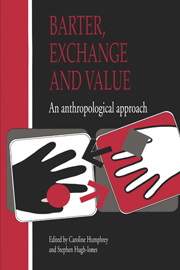Book contents
- Frontmatter
- Contents
- List of figures
- List of contributors
- 1 Introduction: Barter, exchange and value
- 2 Politicised values: the cultural dynamics of peripheral exchange
- 3 Yesterday's luxuries, tomorrow's necessities: business and barter in northwest Amazonia
- 4 Some notes on the economics of barter, money and credit
- 5 Fair dealing, just rewards: the ethics of barter in North-East Nepal
- 6 Inter-tribal commodity barter and reproductive gift-exchange in old Melanesia
- 7 Qualified value: the perspective of gift exchange
- Index
4 - Some notes on the economics of barter, money and credit
Published online by Cambridge University Press: 05 June 2012
- Frontmatter
- Contents
- List of figures
- List of contributors
- 1 Introduction: Barter, exchange and value
- 2 Politicised values: the cultural dynamics of peripheral exchange
- 3 Yesterday's luxuries, tomorrow's necessities: business and barter in northwest Amazonia
- 4 Some notes on the economics of barter, money and credit
- 5 Fair dealing, just rewards: the ethics of barter in North-East Nepal
- 6 Inter-tribal commodity barter and reproductive gift-exchange in old Melanesia
- 7 Qualified value: the perspective of gift exchange
- Index
Summary
Introduction
Barter, and more generally the question of the organisation of exchange, have attracted the attention of economists for a long time. These notes are an attempt to show how some of the problems concerning the organisation of exchange can be addressed from the perspective of modern economic theory and to summarise our own views on the topic. We have endeavoured to avoid technicalities at all costs, and hence omissions have been inevitable.
In a sense these notes contain nothing new. We have pieced together various insights (old and new) which economic theory offers about barter and the organisation of exchange. The result is, we hope, a totally nontechnical view of how some of the problems of the organisation of exchange can be addressed from the perspective of economic theory. Some reflections which are, if not novel, not entirely stale, have emerged along the way. The reader accustomed to the style of modern economic theory will be disappointed, however. We do not ‘work out’ these ideas rigorously, but just suggest how they may be used to further our understanding of the issues at hand.
After apologising to economic theorists for the lack of rigour, let us apologise to anthropologists for the lack of references to the ‘real world’. The approach which we have taken in these notes is rather abstract. This is in the tradition of both orthodox and unorthodox economic theory.
- Type
- Chapter
- Information
- Barter, Exchange and ValueAn Anthropological Approach, pp. 75 - 106Publisher: Cambridge University PressPrint publication year: 1992
- 12
- Cited by



